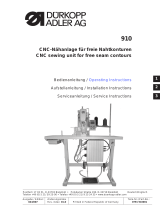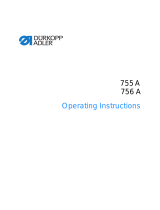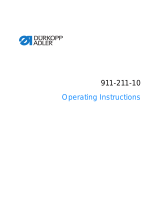Page is loading ...

743-221-01
Service Instructions

All rights reserved.
Property of Dürkopp Adler AG and protected by copyright. Any reuse of these contents,
including extracts, is prohibited without the prior written approval of Dürkopp Adler AG.
Copyright © Dürkopp Adler AG 2018
IMPORTANT
READ CAREFULLY BEFORE USE
KEEP FOR FUTURE REFERENCE

Table of Contents
Service Instructions 743-221-01 - 01.0 - 10/2018 1
1 About these instructions ...........................................................3
1.1 For whom are these instructions intended?..................................3
1.2 Representation conventions – symbols and characters...............3
1.3 Other documents..........................................................................4
1.4 Liability..........................................................................................5
2 Safety...........................................................................................7
2.1 Basic safety instructions...............................................................7
2.2 Signal words and symbols used in warnings................................8
3 Working basis...........................................................................11
3.1 Order of the settings...................................................................11
3.2 Laying the cable guide................................................................11
3.2.1 Swiveling up the machine head..................................................12
3.2.2 Removing and replacing the head cover....................................13
3.2.3 Removing and fitting the arm cover............................................14
3.2.4 Removing and inserting the sliding plate....................................15
3.3 Flats on shafts ............................................................................16
4 Setting the machine head........................................................17
4.1 Gages.........................................................................................17
4.2 Setting the adjusting disc............................................................18
4.3 Setting the arm shaft crank.........................................................19
4.4 Setting the needle thread tension release..................................21
4.5 Setting the thread tensioning spring...........................................22
4.6 Setting the needle bar height......................................................23
4.7 Hook settings..............................................................................25
4.7.1 Setting the loop stroke and the distance of the hook tip to the
needle.........................................................................................25
4.7.2 Setting the hook drive housing...................................................26
4.8 Setting the bobbin case support.................................................28
4.9 Setting the light barrier for the remaining thread monitor...........29
4.10 Setting the winder.......................................................................30
4.11 Setting the position encoder.......................................................31
4.12 Replacing the right-hand arm shaft bearing ...............................32
5 Setting the sewing unit ............................................................35
5.1 Setting the thread trimmer..........................................................35
5.1.1 Assembling and removing the cutter..........................................37
5.1.2 Replacing the piston...................................................................40
5.2 Setting the folding table..............................................................41
5.2.1 Setting the folding table retraction..............................................42
5.2.2 Setting the angular adjustment...................................................44
5.3 Setting the transport carriage.....................................................45
5.3.1 Setting the run-off protection......................................................47
5.4 Setting the configuration set.......................................................48
5.4.1 Setting the guide roller for the configuration set.........................48
5.4.2 Setting the pressing cylinder for the configuration set................49
5.4.3 Setting the closing motion for the configuration set....................50
5.4.4 Setting the configuration set.......................................................52
5.5 Adjusting the pressure monitor...................................................54

Table of Contents
2 Service Instructions 743-221-01 - 01.0 - 10/2018
6 Programming ............................................................................55
6.1 General information....................................................................55
6.2 Calling up the technician level....................................................57
6.2.1 Menu item Machine Config ..................................................58
6.2.2 Menu item User Config .........................................................61
6.2.3 Menu item Service .....................................................................63
6.3 Installing software per dongle.....................................................69
6.4 Checking the functionality of the keys on the control panel........71
7 Maintenance..............................................................................73
7.1 Swiveling up the machine head..................................................74
7.2 Cleaning .....................................................................................75
7.2.1 Cleaning the machine head........................................................75
7.2.2 Cleaning the motor fan sieve......................................................76
7.3 Lubricating..................................................................................77
7.3.1 Checking the machine head lubrication......................................79
7.3.2 Checking the hook lubrication ....................................................79
7.4 Servicing the pneumatic system.................................................80
7.4.1 Setting the operating pressure ...................................................80
7.4.2 Draining the water condensation................................................81
7.4.3 Cleaning the filter element..........................................................82
7.5 Parts list......................................................................................83
8 Decommissioning.....................................................................85
9 Disposal.....................................................................................87
10 Troubleshooting .......................................................................89
10.1 Customer Service.......................................................................89
10.2 Messages of the software...........................................................89
10.3 Errors in sewing process ............................................................94
11 Technical data...........................................................................97
12 Appendix ...................................................................................99
12.1 Wiring diagram ...........................................................................99
12.2 Summary of all settings............................................................103

About these instructions
Service Instructions 743-221-01 - 01.0 - 10/2018 3
1 About these instructions
These instructions have been prepared with utmost care. They contain in-
formation and notes intended to ensure long-term and reliable operation.
Should you notice any discrepancies or if you have improvement re-
quests, then we would be glad to receive your feedback through Custo-
mer Service ( p. 35).
Consider the instructions part of the product and store them in a place
where they are readily available.
1.1 For whom are these instructions intended?
These instructions are intended for:
• Specialists:
This group has the appropriate technical training for performing
maintenance or repairing malfunctions.
With regard to minimum qualification and other requirements to be met by
personnel, please also follow the chapter Safety ( p. 7).
1.2 Representation conventions – symbols and characters
Various information in these instructions is represented or highlighted by
the following characters in order to facilitate easy and quick understan-
ding:
Proper setting
Specifies proper setting.
Disturbances
Specifies the disturbances that can occur from an incorrect setting.
Cover
Specifies which covers must be disassembled in order to access the com-
ponents to be set.
Steps to be performed when operating the machine (sewing and
equipping)
Steps to be performed for service, maintenance, and installation
Steps to be performed via the software control panel
The individual steps are numbered:
First step
Second step
The steps must always be followed in the specified order.
1.
2.
…

About these instructions
4 Service Instructions 743-221-01 - 01.0 - 10/2018
Lists are marked by bullet points.
Result of performing an operation
Change to the machine or on the display/control panel.
Important
Special attention must be paid to this point when performing a step.
Information
Additional information, e.g. on alternative operating options.
Order
Specifies the work to be performed before or after a setting.
References
Reference to another section in these instructions.
Safety Important warnings for the user of the machine are specifically marked.
Since safety is of particular importance, hazard symbols, levels of danger
and their signal words are described separately in the chapter
Safety ( p. 7).
Location
information
If no other clear location information is used in a figure, indications of right
or left are always from the user's point of view.
1.3 Other documents
The machine includes components from other manufacturers. Each ma-
nufacturer has performed a hazard assessment for these purchased parts
and confirmed their design compliance with applicable European and na-
tional regulations. The proper use of the built-in components is described
in the corresponding manufacturer's instructions.
•

About these instructions
Service Instructions 743-221-01 - 01.0 - 10/2018 5
1.4 Liability
All information and notes in these instructions have been compiled in
accordance with the latest technology and the applicable standards and
regulations.
Dürkopp Adler cannot be held liable for any damage resulting from:
• Breakage and damage during transport
• Failure to observe these instructions
• Improper use
• Unauthorized modifications to the machine
• Use of untrained personnel
• Use of unapproved parts
Transport
Dürkopp Adler cannot be held liable for breakage and transport damages.
Inspect the delivery immediately upon receiving it. Report any damage
to the last transport manager. This also applies if the packaging is not
damaged.
Leave machines, equipment and packaging material in the condition in
which they were found when the damage was discovered. This will ensure
any claims against the transport company.
Report all other complaints to Dürkopp Adler immediately after receiving
the product.

About these instructions
6 Service Instructions 743-221-01 - 01.0 - 10/2018

Safety
Service Instructions 743-221-01 - 01.0 - 10/2018 7
2 Safety
This chapter contains basic information for your safety. Read the instruc-
tions carefully before setting up or operating the machine. Make sure to
follow the information included in the safety instructions. Failure to do so
can result in serious injury and property damage.
2.1 Basic safety instructions
The machine may only be used as described in these instructions.
These instructions must be available at the machine's location at all times.
Work on live components and equipment is prohibited. Exceptions are
defined in the DIN VDE 0105.
For the following work, switch off the machine at the main switch or
disconnect the power plug:
• Replacing the needle or other sewing tools
• Leaving the workstation
• Performing maintenance work and repairs
• Threading
Missing or faulty parts could impair safety and damage the machine.
Only use original parts from the manufacturer.
Transport Use a lifting carriage or forklift to transport the machine. Raise the machi-
ne max. 20 mm and secure it to prevent it from slipping off.
Setup The connecting cable must have a power plug approved in the relevant
country. The power plug may only be assembled to the power cable by
qualified specialists.
Obligations
of the operator
Follow the country-specific safety and accident prevention regulations and
the legal regulations concerning industrial safety and the protection of the
environment.
All the warnings and safety signs on the machine must always be in legible
condition. Do not remove!
Missing or damaged warnings and safety signs must be replaced
immediately.
Requirements
to be met by
the personnel
Only qualified specialists may:
• set up the machine / put the machine in operation
• perform maintenance work and repairs
• perform work on electrical equipment
Only authorized persons may work on the machine and must first have
understood these instructions.

Safety
8 Service Instructions 743-221-01 - 01.0 - 10/2018
Operation Check the machine during operating for any externally visible damage.
Stop working if you notice any changes to the machine. Report any chan-
ges to your supervisor. Do not use a damaged machine any further.
Safety
equipment
Safety equipment should not be removed or deactivated. If it is essential
to remove or deactivate safety equipment for a repair operation, it must be
assembled and put back into operation immediately afterward.
2.2 Signal words and symbols used in warnings
Warnings in the text are distinguished by color bars. The color scheme is
based on the severity of the danger. Signal words indicate the severity of
the danger.
Signal words Signal words and the hazard they describe:
Symbols The following symbols indicate the type of danger to personnel:
Signal word Meaning
DANGER (with hazard symbol)
If ignored, fatal or serious injury will result
WARNING (with hazard symbol)
If ignored, fatal or serious injury can result
CAUTION (with hazard symbol)
If ignored, moderate or minor injury can result
CAUTION (with hazard symbol)
If ignored, environmental damage can result
NOTICE (without hazard symbol)
If ignored, property damage can result
Symbol Type of danger
General
Electric shock

Safety
Service Instructions 743-221-01 - 01.0 - 10/2018 9
Examples Examples of the layout of warnings in the text:
This is what a warning looks like for a hazard that will result in serious
injury or even death if ignored.
This is what a warning looks like for a hazard that could result in seri-
ous or even fatal injury if ignored.
This is what a warning looks like for a hazard that could result in
moderate or minor injury if the warning is ignored.
Puncture
Crushing
Environmental damage
Symbol Type of danger
DANGER
Type and source of danger!
Consequences of non-compliance.
Measures for avoiding the danger.
WARNING
Type and source of danger!
Consequences of non-compliance.
Measures for avoiding the danger.
CAUTION
Type and source of danger!
Consequences of non-compliance.
Measures for avoiding the danger.

Safety
10 Service Instructions 743-221-01 - 01.0 - 10/2018
This is what a warning looks like for a hazard that could result in
environmental damage if ignored.
This is what a warning looks like for a hazard that could result in pro-
perty damage if ignored.
CAUTION
Type and source of danger!
Consequences of non-compliance.
Measures for avoiding the danger.
NOTICE
Type and source of danger!
Consequences of non-compliance.
Measures for avoiding the danger.

Working basis
Service Instructions 743-221-01 - 01.0 - 10/2018 11
3 Working basis
3.1 Order of the settings
Order
The setting positions for the machine are interdependent.
Always comply with the order of individual setting steps as specified.
It is absolutely essential that you follow all notices regarding prerequisites
and subsequent settings that are marked with in the margin.
3.2 Laying the cable guide
Ensure that all cables are laid in the machine such that the function of mo-
ving parts is not hampered.
To lay the cable guide:
1. Lay any excess cabling neatly in proper cable snakes.
2. Bind together the cable loops with cable ties.
Important
Tie loops wherever possible to fixed parts.
The cables must be secured firmly.
3. Cut off any overlapping cable ties.
NOTICE
Property damage may occur!
Risk of machine damage from incorrect order.
It is essential to follow the working order specified in these
instructions.
NOTICE
Property damage may occur!
Excess cables can impair the functioning of moving machine parts.
This impairs the sewing function and can result in damage.
Lay excess cable as described above.

Working basis
12 Service Instructions 743-221-01 - 01.0 - 10/2018
3.2.1 Swiveling up the machine head
Fig. 1: Swiveling up the machine head
To swivel up the machine head:
1. Pivot the supporting table (1), bundle clamp, and ejector to the side.
2. Move the configuration set (2) into the left end position.
3. Carefully pivot up the upper machine section using the handle (3) and
lean it against the folding support.
The upper machine section is held in this position through the loca-
tion of the center of mass.
4. Lower the machine in the same way.
WARNING
Risk of injury from moving parts!
Crushing possible.
Switch off the machine before swiveling up the
machine head.
(1) - Supporting table
(2) - Configuration set
(3) - Handle
③
②
①

Working basis
Service Instructions 743-221-01 - 01.0 - 10/2018 13
3.2.2 Removing and replacing the head cover
Fig. 2: Removing and replacing the head cover
Removing the head cover
To remove the head cover:
1. Loosen the glass protection screws (3).
2. Remove the glass protection.
3. Loosen the head cover screws (1).
4. Remove the head cover (2).
Replacing the head cover
To replace the head cover:
1. Replace the head cover (2).
2. Tighten the head cover screws (1).
3. Position the glass protection.
4. Tighten the glass protection screws (3).
(1) - Screws
(2) - Head cover
(3) - Glass protection screws
①
②
①
③

Working basis
14 Service Instructions 743-221-01 - 01.0 - 10/2018
3.2.3 Removing and fitting the arm cover
Fig. 3: Removing and fitting the arm cover
Removing the arm cover
To remove the arm cover:
1. Losen the screws (1).
2. Remove the arm cover (2).
Fitting the arm cover
To fit the arm cover:
1. Fit the arm cover (2).
2. Fasten screws (1).
(1) - Screws (2) - Armcover
①
②

Working basis
Service Instructions 743-221-01 - 01.0 - 10/2018 15
3.2.4 Removing and inserting the sliding plate
Fig. 4: Removing and inserting the sliding plate (1)
To remove the sliding plate:
1. Remove the configuration set (2).
2. Remove the casing (4).
3. Losen the light barrier (5) and thread trimmer (3) and put them down
on the oil pan.
Fig. 5: Removing and inserting the sliding plate (2)
4. Losen the screws (6) on the sliding plate and remove the sliding plate.
NOTICE
Property damage may occur!
Damage to the needle or the sliding plate.
The centring discs must not be twisted. These are used to align the
sliding plate to the needle.
(1) - Gage
(2) - Configuration set
(3) - Thread trimmer
(4) - Casing
(5) - Light barrier
①
③
②
④
⑤
(6) - Screws (7) - Centring discs

Working basis
16 Service Instructions 743-221-01 - 01.0 - 10/2018
3.3 Flats on shafts
Fig. 6: Flats on shafts
Some shafts have flat surfaces at the points where the components are
screwed on. This stabilizes the connection and makes setting easier.
For all settings on the surface, the first screw is screwed in rotational
direction onto the surface.
Important
Always ensure that the screw faces are completely flush with the surface.
(1) - Flat (2) - Shaft
2
1

Setting the machine head
Service Instructions 743-221-01 - 01.0 - 10/2018 17
4 Setting the machine head
4.1 Gages
Fig. 7: Gages
The setting gages listed below allow you to precisely set and check the se-
wing unit.
WARNING
Risk of injury from moving parts!
Crushing possible.
Switch off the machine before setting the machine
head.
WARNING
Risk of injury from sharp parts!
Puncture possible.
Switch off the machine before setting the machine
head.
(1) - Locking peg
(2) - Gage
(3) - Feeler gage
(4) - Gage
(5) - Sleeve
Position Setting gage Order number Use
1 Locking peg 9301 022608 For locking the sewing unit in
place at position A - F.
2 Gage 0935 107077 For aligning the transport car-
riage, checking the reference
point, guide roller, and center
of the needle.

Setting the machine head
18 Service Instructions 743-221-01 - 01.0 - 10/2018
4.2 Setting the adjusting disc
Fig. 8: Setting the adjusting disc
Use the locking peg (3) and the adjusting disc (4) integrated on the toothed
belt wheel of the arm shaft to lock the sewing unit in place in all setting po-
sitions.
To do this, the adjusting disc is equipped with six slots which are identified
on the handwheel (1) with the letters A, B, C, D, E, and F. In conjunction
with the marking (2), the letters indicate the position of the slots in which
the machine can be locked in place using the peg (3).
Slot A (loop stroke position) is deeper than the other slots. In the individual
positions, the following can be set:
3 Feeler gage 0933 080200 For setting and checking the
guide roller.
4 Gage 0935 107071 For aligning the needle bar
height and hook drive housing.
5 Sleeve 0935 107090 For aligning the remaining
thread monitor.
(1) - Handwheel
(2) - Marking
(3) - Locking peg
(4) - Adjusting disc
Slot Setting
A Adjusting disc to groove in the arm shaft crank, belt wheel,
loop stroke, distance of hook tip to needle
B No function
C 2. Needle position (thread lever upper position)
D No function
E Needle bar height
F No function
Position Setting gage Order number Use
①
②
③
④③
/









